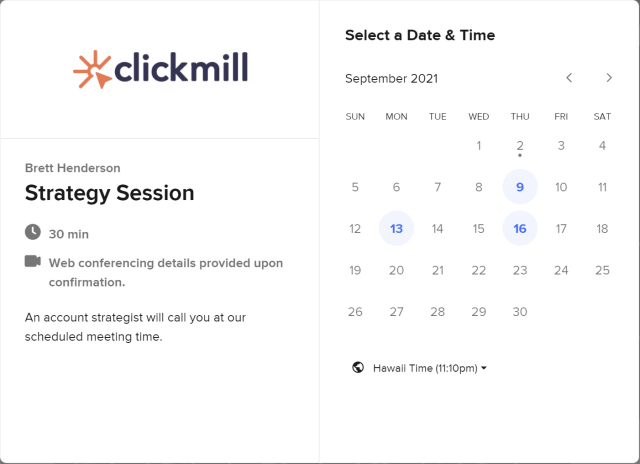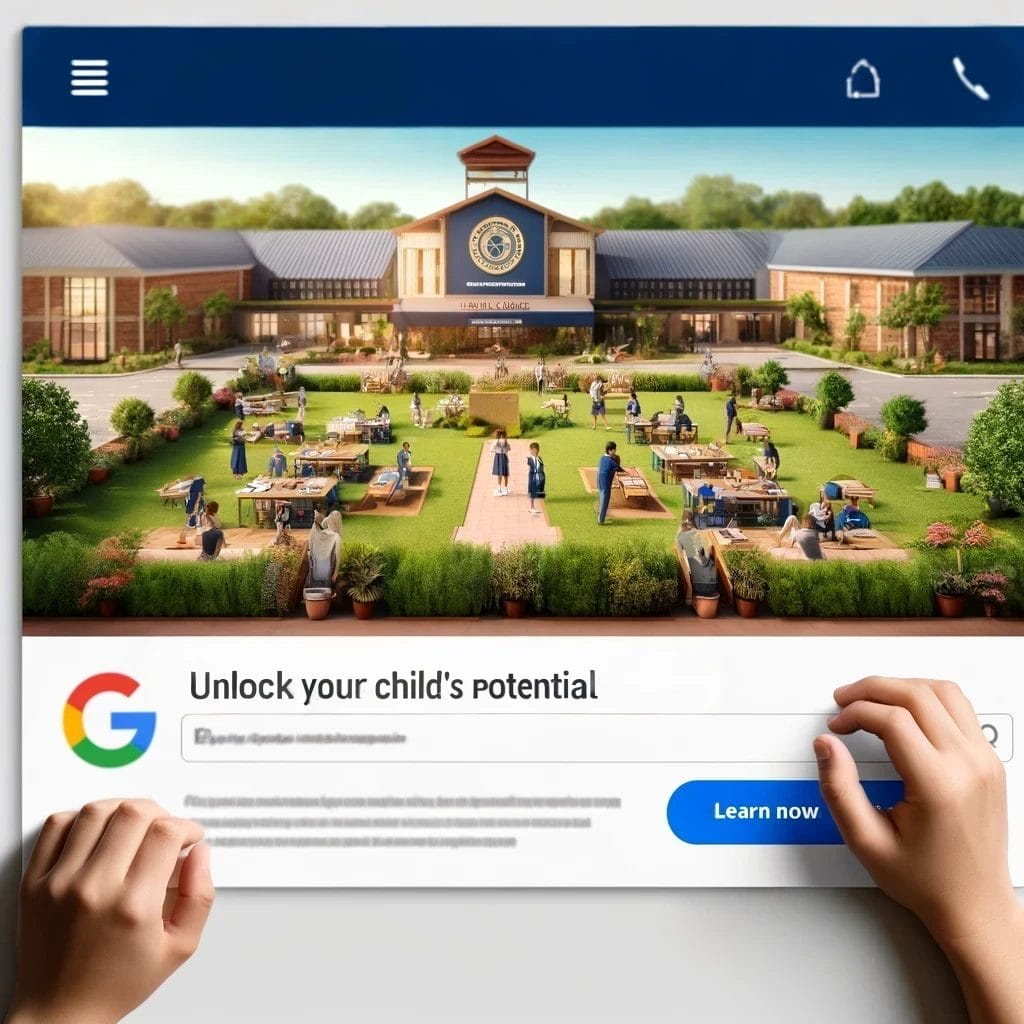Private school advertising uses both traditional and digital methods to increase enrollment and visibility. Traditional advertising includes print and local media, while digital advertising uses platforms like Google Ads for inbound strategies and Facebook for outbound approaches. Knowing how to balance advertising and marketing, and using professional services, can greatly improve a school’s outreach and enrollment efforts.
Are you wondering if private school advertising strategies can increase your enrollment?
In the competitive landscape of private school marketing, standing out and attracting the right families is paramount.
he solution lies not just within the realm of traditional marketing but extends into the dynamic world of private school advertising.
Let’s dive into what this entails and how it can transform your school’s visibility and appeal to prospective families.
What is Private School Advertising?

Private school advertising is a focused approach aimed at promoting educational institutions directly to potential students and their families.
Unlike broad-spectrum marketing, advertising is about leveraging specific channels and tactics to convey your school’s unique offerings and advantages with precision and impact.
In today’s digital age, this often translates into online campaigns that reach audiences where they spend a considerable amount of their time: on the internet.
The essence of private school advertising lies in its ability to not only inform but also engage and persuade the target audience.
It’s about creating compelling narratives that resonate with the values, aspirations, and needs of prospective families.
This can range from showcasing the excellence of academic programs, the richness of extracurricular activities, to the nurturing environment that fosters students’ growth and development.
In the context of increasing school enrollment, advertising becomes a powerful tool to cut through the noise and directly communicate the value and opportunities that await at your private school.
Through targeted ads, you can highlight what makes your institution the ideal choice for education, directly addressing the queries and concerns of parents and students in their decision-making journey.
Stay tuned as we explore the intricacies of advertising versus marketing, delve into the strategies that set them apart, and examine how inbound marketing for schools contrasts with outbound advertising methods.
We’ll also take a closer look at the effectiveness of platforms like Facebook and Google Ads in the sphere of private school advertising, guiding you towards crafting a digital marketing strategy that not only captures attention but also drives enrollment.
Traditional vs. Digital Advertising in Private School Marketing

In the evolving landscape of private school marketing, the debate between traditional and digital advertising methods is increasingly relevant.
While traditional channels like radio, billboards, and mailers have long been staples of advertising, the digital age introduces a cost-effective and measurable alternative that is proving indispensable for schools aiming to optimize their marketing budget and reach.
Understanding Cost Per Click Advertising (CPC)
At the heart of digital advertising’s appeal is the concept of Cost Per Click (CPC), a model where advertisers pay only when a user clicks on their ad.
This stands in stark contrast to traditional advertising methods, where costs are incurred for the mere placement of ads, regardless of their performance or engagement level.
CPC offers a direct link between advertising spend and potential interest from prospective families, ensuring that every dollar spent is an investment in engaging with a user who has shown explicit interest in your ad.
The Efficiency of Digital Advertising
Digital advertising, particularly through platforms like Google Ads and Facebook, provides an unparalleled level of targeting and measurement.
Schools can refine their audience based on specific criteria such as location, interests, search behavior, and even retarget users who have previously interacted with their website but haven’t yet taken the step to inquire or apply.
This precision ensures that your advertising efforts concentrate on the individuals most likely to be interested in your school, maximizing the efficiency of your spend.
Moreover, digital platforms offer real-time analytics, allowing schools to track the performance of their ads in terms of clicks, impressions, and conversions.
This data not only validates the cost-effectiveness of digital advertising but also provides valuable insights for optimizing campaigns and improving ROI over time.
Cost-Effectiveness Compared to Traditional Options
Traditional advertising methods, while broad-reaching, lack the targeting and analytics capabilities of their digital counterparts.
The cost of placing an ad on a billboard, radio spot, or mailer campaign is often high, with the pricing structure based on estimated exposure rather than actual engagement or interest.
This means private schools may end up paying a substantial amount for advertising that reaches a wide audience, most of whom may not be in the market for a private school education.
Additionally, the effectiveness of traditional advertising is harder to measure, making it difficult to ascertain the return on investment.
Without concrete data on how many prospective parents saw the ad, how many were engaged by it, and how many took action as a result, optimizing campaigns for better performance becomes a challenge.
In contrast, digital advertising’s CPC model, coupled with its targeting and analytics capabilities, offers a more cost-effective and measurable approach.
By investing in digital advertising, private schools can ensure that their marketing dollars are spent wisely, engaging with an audience that is not only large but also interested and measurable.
Embracing Digital Advertising
As private schools navigate the competitive landscape of student recruitment, the shift towards digital advertising represents a strategic move towards cost-efficiency, targeted outreach, and measurable results.
In an era where every marketing dollar counts, the advantages of digital advertising, underpinned by the CPC model, make it an indispensable tool for private schools looking to maximize their advertising efforts and connect with prospective families in a meaningful way.
Do You Need Private School Advertising or Private School Marketing?

Understanding the nuanced differences between advertising and marketing is crucial for private schools aiming to develop a holistic and effective strategy to increase enrollment.
While both are essential components of a school’s outreach efforts, they serve distinct roles within the broader scope of attracting prospective families.
Private school advertising is a targeted subset of the wider marketing universe.
It involves specific actions aimed at promoting the school to potential students and their parents through various paid channels.
These can range from online ads on social media platforms and search engines to traditional methods like print ads and billboards.
The key characteristic of advertising is its direct and paid approach to conveying the school’s message to a selected audience.
On the other hand, marketing encompasses a broader array of strategies and activities that a private school undertakes to build relationships and communicate its value proposition to its target audience.
Marketing is not just about speaking to prospective families; it’s about listening to their needs and preferences, understanding the competitive landscape, and positioning your school accordingly. It includes several critical components:
- SEO (Search Engine Optimization): This involves optimizing your school’s online content so that it ranks higher in search engine results for relevant keywords. SEO is vital for making your school more visible to parents and students who are actively searching for educational opportunities.
- Content Marketing: This strategy focuses on creating and sharing valuable content to attract and engage a defined audience. For private schools, this could mean publishing articles about your educational philosophy, success stories from alumni, or insights into your extracurricular activities. Content marketing aims to establish your school as a thought leader and a desirable choice for education.
- User Experience Design: The design and functionality of your school’s website play a significant role in marketing. A well-designed website that offers a seamless user experience can significantly enhance parents’ and students’ perceptions of your school. This includes easy navigation, fast loading times, and accessible information about programs, admissions, and campus life.
- Social Media Marketing: Utilizing platforms like Facebook, Instagram, and X (formerly known as Twitter) allows schools to connect with their community, share updates, and showcase their culture and achievements. Social media marketing is an excellent way to engage with prospective families in a more informal and interactive environment.
Incorporating these various facets of digital marketing into a comprehensive private school marketing plan ensures a multifaceted approach to reaching and engaging with potential families.
While advertising puts your school in front of prospective students and parents, the broader marketing strategies build and nurture these relationships, guiding them towards making the decision to enroll.
Together, advertising and marketing form a synergistic approach that can significantly enhance your school’s visibility, appeal, and ultimately, enrollment numbers.

Get A Proven Marketing Plan That Increases Enrollments When You Book A Call Today!
Receive customized advice to help your school attract more families!
Inbound Marketing for Schools vs Outbound Advertising

In the context of private school enrollment strategies, distinguishing between inbound marketing and outbound advertising is essential for crafting a plan that not only reaches but also resonates with prospective families.
While both approaches aim to increase visibility and attract students, they operate on fundamentally different principles and yield distinct outcomes.
Outbound Advertising: The Traditional Path
Outbound advertising represents the more traditional form of marketing, where the school initiates the conversation by pushing messages out to a broad audience. This can include methods such as print ads in magazines, radio commercials, billboards, or paid online ads. The approach is largely interruptive, aiming to capture the attention of potential families amidst their daily activities. While outbound advertising can increase a school’s visibility quickly, its shotgun approach means it often reaches individuals who are not actively seeking a private school education, leading to MUCH lower engagement rates and a less efficient use of marketing budgets.
Inbound Marketing: The Modern Engagement
In contrast, inbound marketing for schools focuses on creating and sharing content that draws interested families towards the school naturally. This strategy leverages the power of content marketing, SEO, social media, and user experience ( UX ) design to build a digital presence that aligns with the interests and search behaviors of prospective parents and students. For example, a private school might show targeted advertisements on popular search engines for specific search terms prospective parents are using to find you, such as, “best private schools near me.“
The essence of inbound advertising lies in its non-intrusive nature. Instead of interrupting potential families with broad messages, it provides them with the answers they are looking for at the time and place they need it.
This method not only brings more qualified leads into your private school marketing funnel but also fosters a positive relationship from the first interaction, as the school is perceived as a helpful resource rather than an interruptive advertiser.
The Synergy and Balance
While inbound marketing and outbound advertising serve different purposes, they are not mutually exclusive.
A balanced approach that incorporates both strategies can be particularly effective for private schools. Outbound advertising can be used to boost immediate visibility and awareness, particularly for schools new to the market or those launching a new program.
An inbound marketing strategy builds a longer-term foundation, nurturing leads through valuable content and interactions that establish trust and credibility over time.
Ultimately, I recommend private schools on a budget to begin with inbound marketing strategies and the move into outbound marketing strategies later.
This is because it is much more cost effective to sell a service to someone who has already identified themselves as someone who wants what you are offering.
Inbound advertising is the proverbial low hanging fruit of private school advertising.
Google Ads as an Inbound Strategy for Private School Advertising

When it comes to effective private school advertising within a budget-conscious framework, initiating your efforts with Google Ads is a strategic move.
Recognized as a potent inbound marketing tool, Google Ads aligns with the intent of users actively searching for educational opportunities.
This critical distinction underpins its recommendation as the primary step in your advertising journey.
Google Ads thrives on the premise of search intent—capturing the attention of prospective parents and students at the moment they are seeking information about private schools.
This method ensures that your advertising efforts are highly targeted, reaching individuals who have already expressed an interest in what your school offers.
With sophisticated targeting options, schools can tailor their ads based on specific keywords, geographic locations, and even the time of day, making each click a valuable opportunity to connect with a genuinely interested audience.
By leveraging Google Ads as the cornerstone of your inbound advertising strategy, you’re effectively employing an inbound mindset.
This approach not only conserves your budget by focusing on high-intent users but also sets a strong foundation for trust and interest, vital components for nurturing prospective families through the enrollment funnel.
Facebook Advertising as an Outbound Approach for Private Schools

Transitioning to Facebook Advertising represents a natural progression in broadening your school’s advertising reach.
While Google Ads captures those in active pursuit of educational options, Facebook Advertising allows schools to reach potential families who may not be actively searching but are likely candidates for your messaging.
Facebook operates as an outbound advertising channel, where schools can introduce themselves to prospective families within the environment of their daily social media interactions.
Through detailed demographic targeting, including interests, behaviors, and connections, Facebook Ads enable schools to present their offerings to a wider but still relevant audience.
This approach is particularly useful for building awareness and sparking interest among users who might not have realized they were in the market for a private school education.
The visual and interactive nature of Facebook Ads, combined with the platform’s storytelling capabilities, offers a unique opportunity to showcase your school’s community, achievements, and values.
Engaging content such as virtual tours, event highlights, and testimonials can capture the imagination of prospective families, encouraging them to explore what your school has to offer.
By starting with Google Ads to engage users with high intent and expanding into Facebook Advertising for broader outreach, private schools can craft a comprehensive advertising strategy.
This combination leverages the precision of inbound marketing through Google Ads with the expansive potential of outbound marketing via Facebook.
Together, these platforms form a dynamic duo, maximizing visibility and engagement among both actively searching families and those yet to consider the benefits of private school education.
Digital Marketing Services for Schools

In the digital age, where the landscape of private school marketing is ever-evolving, standing out and connecting with prospective families requires a nuanced, strategic approach.
Whether you’re looking to optimize your school’s online presence, engage more deeply with your community through social media, or leverage the power of search engines to attract interested families, our suite of digital marketing services is designed to meet your needs.
With a focus on measurable results, tailored strategies, and a deep understanding of the educational sector, our team is equipped to elevate your school’s digital marketing efforts.
From crafting compelling content that resonates with your audience to implementing targeted ad campaigns that maximize your budget, we’re here to help you navigate the complexities of the digital world and connect with families looking for the exceptional education you offer.
Don’t let the opportunity to enhance your school’s online visibility and appeal slip by.
Book A Call now to schedule a consultation and learn how our digital marketing services can transform your private school marketing strategy.

Get A Proven Marketing Plan That Increases Enrollments When You Book A Call Today!
Receive customized advice to help your school attract more families!
Private School Marketing Consultant

Navigating the competitive landscape of private school marketing demands expertise, creativity, and a strategic mindset.
If you’re seeking to refine your marketing strategy, enhance your brand presence, or achieve specific enrollment goals, our private school marketing consultant services are tailored to guide you to success.
Our consultants bring a wealth of experience in the education sector, offering personalized insights and strategies that align with your school’s unique challenges and opportunities.
From conducting comprehensive market analyses to developing bespoke marketing plans that resonate with your target audience, our goal is to empower your school to stand out and attract the right families.
Whether you’re exploring new marketing channels, seeking to improve your current efforts, or looking to build a comprehensive marketing strategy from the ground up, our consultants are ready to assist.
By partnering with us, you gain access to expert advice, innovative strategies, and practical solutions that drive results.
Ready to take your private school marketing to the next level?
Book A Call now with our private school marketing consultant.
Let’s work together to craft a marketing plan that not only reaches but also surpasses your enrollment and engagement goals.
That brings us to the end of this article on private school advertising.
Let’s wrap it up with some common questions.
Private School Advertising FAQ
Digital marketing focuses on online strategies to connect with prospective families through targeted and measurable campaigns. Unlike traditional marketing, which relies on broader, less targeted methods like print ads or billboards, digital marketing uses platforms like search engines and social media to engage interested audiences directly.
Google Ads can significantly enhance your school’s visibility to families actively searching for educational options. By targeting specific keywords related to private schooling, Google Ads ensures that your school appears at the top of search results, capturing high-intent users and directing them to your website.
Facebook Ads are typically considered outbound marketing because they reach out to potential families on social media, even if they aren’t actively searching for a private school. However, the targeting capabilities of Facebook allow for a somewhat inbound approach by engaging users based on interests and behaviors that align with your school’s offerings.
CPC is cost-effective because it ensures that you only pay when someone clicks on your ad, indicating interest. This direct correlation between spending and engagement allows for efficient use of your marketing budget, targeting only those who show genuine interest in your school.
Results can vary, but it’s common to see initial engagement and traffic increases within the first few months of a digital marketing campaign. For more substantial outcomes like enrollment increases, it may take longer, around 6 to 12 months, as families go through the decision-making process.
A private school marketing consultant analyzes your current marketing strategies, identifies opportunities for improvement, and develops a customized plan to achieve your goals. They bring expert insights into the latest marketing trends and tactics, helping your school to attract and retain more families effectively.
Yes, digital marketing strategies, especially those focused on search engine optimization (SEO) and content marketing, can significantly improve your school’s ranking on search engines. By optimizing your website and content for relevant keywords, you can increase your visibility to families searching for private schools.
User experience is crucial because it directly impacts how families interact with your school’s website and digital content. A positive user experience, characterized by easy navigation, fast loading times, and accessible information, can enhance perceptions of your school and encourage prospective families to explore further.
Social media marketing allows private schools to build and nurture a community, engage with families through compelling content, and showcase the school’s culture, events, and achievements. It’s an effective way to connect with prospective and current families on platforms where they already spend their time.
The first step is to clearly define your goals and target audience. Understanding what you aim to achieve and who you’re trying to reach will guide your choice of digital marketing channels and strategies, ensuring that your efforts are focused and effective.
Do you think Google Ads and Facebook Ads, is the best way for you to begin private school advertising? Let us know in the comment section below.

Responses